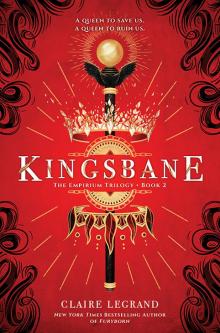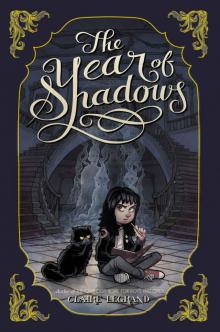- Home
- Claire Legrand
Lightbringer Page 3
Lightbringer Read online
Page 3
Then they refastened her chains, and when they turned her toward the door to escort her back to her cell, Admiral Ravikant stood at the threshold, hands clasped at his waist. An angel in possession of Ioseph Ferracora’s body.
Eliana’s heart dropped at the sight of her adoptive father’s face—the dark hair and sharp chin that were perfect duplicates of Remy’s. The short, muscled body she had once thought reassuringly solid and now saw as grotesque, a bullish facade.
The black eyes that held nothing inside them, emptier even than her windowless cell.
Admiral Ravikant watched her in silence, and she could only stare at him, her mouth dry and her heart beating fast.
When he spoke, it was in Ioseph Ferracora’s voice, all its warmth gone, and Eliana wanted to be sick once more, though she had no food left in her stomach.
“Dirty yourself like that again,” he said, “and I’ll come back with your brother and demonstrate how ingenious a dealer of pain I can be. Refuse to eat another meal, and I’ll truly grow angry.”
He left without another word, and though she hated herself for it, as the adatrox brought her back to her cell, Eliana searched the ship’s dim corridors for familiar ash-blond hair, a trim profile, a gleam of ice-blue eyes.
Your eyes are like fire.
She could not stop hearing the sound of her own voice in her memory—nor could she stop feeling the ghost of his hands upon her, the echo of his lips.
But the shadows shivering in the ship’s labyrinthine hold were only angels in stolen skins and dead-eyed adatrox marching mindlessly after their masters.
Simon was nowhere to be found.
• • •
Eliana twisted her wrists against their bindings, though not to free herself, for she had determined that to be a futile task. Even if she escaped her chains, even if she somehow made it past the guards standing sentry outside her door, what then? What would she do? Dive into the middle of the sea and swim to safety, dragging Remy along behind her through the waves?
Once, not so long ago, she could have concentrated on the twin metal cages of her castings and used their solidity, the smooth anchors of the discs in her palms, to draw fire from the gas lamps lining the hallways and urge them into great bursts, scorching anyone who tried to stand against her.
But now, she could not find even a scrap of will to attempt summoning her power. Without her castings, she was a shell, scraped free of its meat and tossed into the waves. Reaching for the empirium would result only in bitter disappointment. She sensed it as surely as she smelled the tang of her own blood in the air, leaking from the wounds on her wrists.
There was an absence in her now—a great impassable void between the power lying in wait within her and the capacity of her mind to do anything more than stare blankly at the wall as Admiral Ravikant’s ship bore her ever onward across the Great Ocean, toward the eastern continent.
Toward Celdaria.
Toward the Emperor.
The chafing of her wrists’ tender flesh against the unyielding metal chains provided her with a perverse comfort there in the endless dark. A constant burning pain that reminded her where she was, that she was a prisoner, that her castings had been wrested from her. That one of her fathers was dead, his body long ago turned to ashes by his own lover’s will; that her other father was also dead, his corpse overtaken by an angel for ill use.
That one of her mothers was dead, too, by her own hand.
And the other…
The moments when she thought of Rielle were the moments in which Eliana strained against her chains with a fevered sort of hunger.
She could have killed her.
When Simon had sent her back to the Old World, to the foothills of those unfamiliar Celdarian mountains, she had encountered her mother—had locked eyes with Rielle, had breathed the same air—and she had lost focus, allowing fear to overtake her. At that most crucial moment, she had fumbled, missing the opportunity that would have solved everything and prevented all of this—this, being a prisoner aboard this immaculate ship, the scent of which sat foul and heavy upon her tongue; this, the sound of Remy’s horrified despair as he had cried out, weeping, at the sight of Ioseph’s altered, black-eyed face.
This—the moment she had turned upon the pier on the shores of Festival and seen with her own eyes the terrible sight of Simon shooting their allies one by one, barking out angelic commands that the imperial soldiers had rushed to obey.
Eliana could have stopped it all from happening. She could have, but instead she had entertained the foolish thought of peace, of conversation and understanding between her and the greatest evil the world had ever known: Rielle Courverie, born Rielle Dardenne. The Blood Queen, the Kingsbane, the Lady of Death.
Eliana could have killed her, but she had tried to talk to her instead. Talk to her. As if a creature so vile would ever have the presence of mind or the desire to talk about ending the disastrous war of her own making, still raging a thousand years past her horizon.
And who had engineered that meeting? Who had sat with her and Remy and helped Eliana craft just the right sentences to say in Old Celdarian?
Simon. She forced herself to say his name, first in her mind and then out loud, hoping that soon the sound of it, the rhythm of the syllables, would stoke in her not a hollow, numb despair but rather a rage, cold and clean.
“Simon,” she whispered. She stared into the relentless darkness. “Simon. Simon.”
She pushed hard against her bindings, rubbing, twisting.
Maybe she would hit bone, if she worked hard enough at it.
Maybe she would bleed herself dry.
• • •
One of them must have reported to him what she was doing.
Keys jangled in the lock. The door to her cell opened, and clipped bootsteps approached her. She recognized those footfalls. They tore her from a fitful sleep, and she watched in breathless horror as he crouched before her, arms resting lazily on his knees. He was in silhouette, his shape black against the lamplit corridor outside her cell, but she caught the faint gleam of his eyes.
She made herself stare at him, unblinking and unafraid, though that was a lie she was certain he could see through. Her body was weak, malnourished, and the sight of him sparked in her a rage too violent to bear. She quaked at his nearness. Her fingers twitched. She imagined clawing at him.
“Simon,” she said, and her voice, at least, emerged steady and flat, as she had intended.
“You’re hurting yourself,” he observed. “I cannot allow that.”
The sound of his voice was both familiar and utterly, horribly foreign. She had never heard it so cold, so devoid of passion, humor, anger. It held only brisk efficiency, his every word clipped and unfeeling.
“I don’t care,” she replied—a sulky child’s response, but she could manage nothing better.
“The Emperor has requested that you arrive unmarred and healthy.”
“The Emperor can go fuck himself, and you can join him.”
She looked for the man she knew in his shadowed face and saw nothing, not even a ripple of scornful amusement. He rose to his feet and stepped aside as the pair of imperial guards waiting at the door entered in silence.
“Take her to B Deck,” he ordered. “The Blue Room.”
Then Simon turned on his heel and strode away, his long, lean body moving with the same sinuous grace it always had. His departure made her wild. If she’d had the freedom to do it, if she had been sure it wouldn’t result in some awful fate for Remy, she would’ve launched herself at him, wedged her fingernails into the scarred furrows on his face, torn strips of flesh from his neck, and ripped out his throat.
Leaving her only seconds after showing himself for the first time in days? That she could not abide.
“Don’t go,” she blurted, desperate. Awful as he was, he was the only thi
ng she knew in this terrible place. She felt that she had begun to lose pieces of herself, huddled in the dark like a kicked animal, but seeing him kneel before her, wishing viciously for his death—and to be its dealer—had awakened her.
He ignored her, striding on.
Frantic, she lunged against the guards’ grips on her elbows. “I assume the Emperor has plans for me. Won’t those proceed more quickly if I come to him informed of my situation rather than ignorant of it?”
He paused a few paces from the door and glanced back over his shoulder. “The Emperor’s plans will proceed quickly, regardless of your ignorance.” Then, to the guards, he said, “You have your orders.”
He was gone soon after, and as Eliana was escorted out of her cell and through an endless, softly rocking maze of carpeted hallways, she began to doubt that he had ever been there at all.
• • •
After that, she was never alone.
They brought her to a spacious apartment on one of the upper decks. A plush carpet of midnight blue stretched beneath a pale violet ceiling, the painted wood embellished with depictions of unfamiliar constellations. A chandelier hung from the rafters, links of crystal shivering as the boat rocked and hummed, and the bed was massive, a monstrosity of periwinkle and indigo satin that seemed to leer as a trio of angelic attendants undid Eliana’s chains and tugged off her clothes.
Two guards watched the doors, and four more were stationed at the windows, past which stretched a glimmering blackness—the ceaseless waves, a touch of moonlight. The sight of the world beyond the ship shattered something fragile and tender in Eliana’s throat, and as the attendants cleaned and bandaged her wrists, she swallowed hard against tears.
In the adjacent bathing room, they scrubbed her from head to toe with steaming water that poured from a gleaming brass faucet. Their movements were brisk but not violent, and Eliana wondered what exactly the Emperor’s orders had been. If she did her utmost to goad them into hurting her, would they indulge her?
If she tried to kill herself, put an end to all of this before the Emperor could, would he slip inside her and hold her hostage inside her own mind, preventing her from doing anything except lying on that giant blue bed in silence until the ship made port in Celdaria?
She laughed a little at the image, and once she started, she could not stop. As the attendants worked soap through her shoulder-length cap of curls, hysterical laughter spilled out of her. Eliana watched herself in the mirror as they combed through her dark-brown hair, its waves and loose curls, its knotted snarls. The sight reminded her numbly of Dani Keshavarzian, who had cut her tangle-prone hair to her jawline, back in Willow. Thinking of Dani, of the Admiral’s Jubilee, of everyone dead on that beach in Festival, she expected tears, but none came.
The attendants smoothed creams into her skin, its pale-brown color and warm olive tones painted wan and shadowed by the dim candlelight. They softened and plumped her as they might a hunk of meat. Then they dressed her in a shapeless nightgown of violet silk and retreated, leaving her alone with her six guards.
One of them pointed at the bed. “Sleep.”
She obeyed, because if she stood for one more moment on her shaking legs, she would collapse, and she could not bear the indignity of angelic soldiers dragging her unconscious to her bed.
She climbed atop it, wobbly as a newborn foal. The perfumed scent of the soaps the attendants had used made her gag. She sank into her pillows, turned away from those twelve staring black eyes, and for the first time since waking aboard the admiral’s ship, she wept.
• • •
For days, she lay in quiet agony among the piles of blue silk that had become her entire world.
And in her dreams, he visited her.
First he was Remy, being dragged away down that endless red corridor of which she’d first dreamed in Astavar. She chased after him, running for miles along the blood-sodden carpet, but whoever or whatever was pulling him was too fast for her, too strong, and the end of the corridor was quickly unraveling, the pieces of it exploding outward like shards of shattered red glass.
Then he was Ioseph, the father who had raised her, lying on a clean white table in a clean white room, being cut open by angels in clean white robes. Each of them wore one of the masks she had seen at the Jubilee in Festival: a metallic black raven, a smiling brass fox, an ivory peacock studded with turquoise jewels. Ioseph screamed as the angels’ knives pierced him, and then a funnel of black came spinning down from above, forcing itself into his mouth, his nose, his gaping chest.
Next he was Simon, coming to her in the little room at Willow with the slanted ceiling and the tiny hot stove, the bed tucked into the corner. His muscles trembled as he moved inside her, and his arms around her were warm and strong. They steadied her and they pinned her and they exhilarated her. He placed his palm against her forehead, and the warmth of that gentle touch soothed her. She followed the quiet trail of his touch down, down, down into a hot black tunnel buried deep in her mind. Her own heartbeat drummed faster and faster in her ears, so loud it shook her chest, and suddenly she wanted to leave Simon, she wanted to run from him and never look back. But she couldn’t free herself from his arms. She was trapped there in the little bed, in the spiraling tunnel, with the boom of her heartbeat drowning her, choking her, and his mouth was upon her, his fingers pressing between her lips, against the tender curve of her neck, and she craved the pressure of his touch even as she despised it.
“Your eyes,” he whispered into her hair, “are like fire.”
A terrible scorching heat bloomed inside her. It started in her belly and grew and rose until she was pressing the heels of her palms to her cheeks, burning her fingers on the twin firepits where her eyes used to be, and Simon’s laughter was everywhere, a roughshod accompaniment to her racing heart.
Harkan’s voice rose through the crackling inferno: El, if you can do something, do it now!
She saw herself kneeling in the mud outside the city of Karlaine, pressing her glowing hands into the terrible wound on Remy’s stomach—
A sucking swoop of sound, then silence. Darkness.
“Ah.” A little sigh. Smooth words stretched around a smile. “There you are.”
She turned in her bed at Willow, in that little room with the slanted ceiling, rain tapping its cold fingers against the windows. Sitting in the corner, in a chair draped with Simon’s clothes, was a man in black, white fingers steepled at his lips.
His smile widened when her eyes alighted upon him, and the sight of him sitting there, content in his amusement, was such a flawless portrait, so startlingly beautiful, that Eliana found herself weeping anew.
“Welcome home, Your Highness,” he said to her, and then rose, the shadows of the room converging on him, shaping the clean black lines of his cloak, his coat, his hair—
• • •
Eliana awoke as the ship shuddered, then stilled.
The endless rocking was no more, and outside the windows of her blue room there was sunlight, a broad pink sky, a pair of gliding white gulls.
She sat up, her shaking limbs slick with sweat. Bedsheets ruined, eyes burning, cheeks raw and wet.
When the door opened, Admiral Ravikant strode into the room. Eliana’s three attendants flanked him, opulent fabrics draped over their arms.
“We’re here,” she croaked. She had not used her voice in days, perhaps weeks. “Aren’t we?”
The admiral’s smile was jubilant, the ghost of her father’s face alight with an expression of frenzied joy she had never seen him wear.
“Get dressed,” he commanded. “He is waiting for you.”
3
Audric
“Fear not, Celdaria: The traitor Audric Courverie no longer sits on Katell’s sacred throne. The murderous Kingsbane has fled in fear. At last, the mysterious attacks plaguing the eastern borders, leaving our citizens pal
e and disfigured in their homes, will end. At last, we will find justice for what we have lost. At last, the House of Sauvillier will bring Celdaria’s enemies to their knees. Look to the capital and rejoice, for though the crown was weak, it is now strong once more. All hail His Majesty Merovec Sauvillier, the True King of Celdaria!”
—A royal decree issued upon Merovec Sauvillier’s assumption of the Celdarian throne, November 8, Year 999 of the Second Age
Audric would have flown for days, if Ludivine had let him.
In the sky, with only the low clouds and Ludivine and Atheria for company, he was almost able to forget everything that had happened. He existed in a soft gray world, even when the sunlight hit him full on, so brilliant and hot that beads of sweat rolled down his brow and back and pasted his clothes to his skin.
His clothes—trousers of the finest wool, boots polished to a faultless shine, a tunic of emerald silk, an embroidered coat of white and gold that hugged his trim torso.
The clothes he had worn to his wedding only days earlier.
“Hush,” Ludivine told him the first time memories of that night managed to penetrate the numb fog that had fallen over him. She rode behind him on Atheria, arms wrapped around his waist, cheek pressed against his back. “There’s no sense in thinking of that now. Not until we’re safe.”
Safe. He laughed, but only a little. He hadn’t the energy for more than that, and certainly not enough to talk to her, even if he’d wanted to.

 Furyborn
Furyborn Queen of the Blazing Throne
Queen of the Blazing Throne Lightbringer
Lightbringer Kingsbane
Kingsbane Cavendish Home for Boys and Girls
Cavendish Home for Boys and Girls The Year of Shadows
The Year of Shadows Some Kind of Happiness
Some Kind of Happiness The Cavendish Home for Boys and Girls
The Cavendish Home for Boys and Girls Sawkill Girls
Sawkill Girls Foxheart
Foxheart Summerfall: A Winterspell Novella
Summerfall: A Winterspell Novella